Why Regular Cage Cleaning Is Essential for Your Guinea Pig's Health
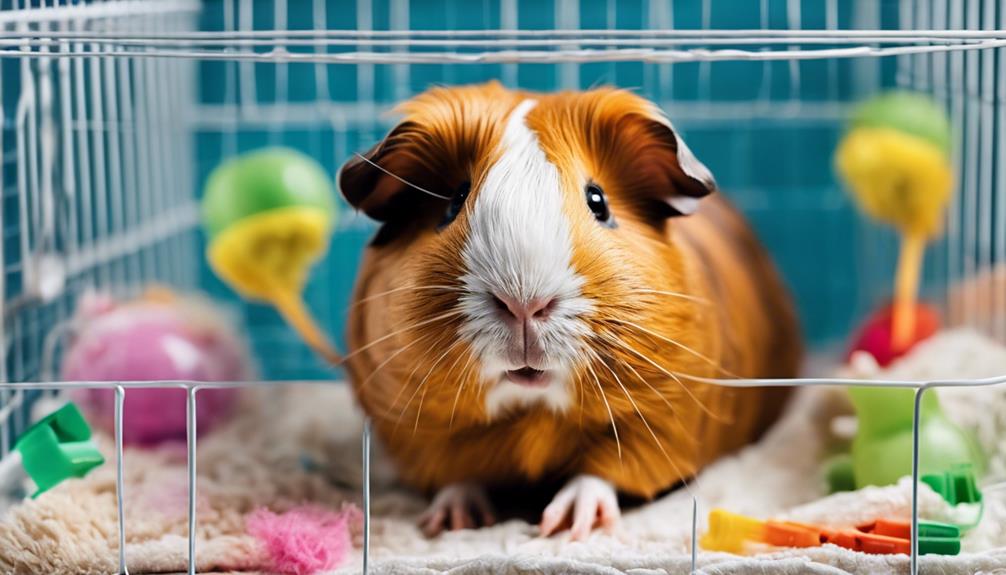
Guinea pigs are small animals that are often kept as pets. They are social creatures that can bring a lot of joy to their owners. It is important to provide them with a clean and healthy environment to ensure their well-being. Regular cage cleaning is essential for maintaining the health of your guinea pig.
A dirty cage can lead to a buildup of bacteria, ammonia from urine, and other harmful substances that can be detrimental to your pet's health. It can also attract pests and parasites that can transmit diseases to your guinea pig. Therefore, cleaning your guinea pig's cage on a regular basis is crucial for preventing illness and keeping your pet happy and healthy.
In addition to cleaning the cage itself, it is also important to provide fresh bedding, clean water, and a balanced diet to ensure the overall health and well-being of your guinea pig. Regular cage cleaning should be part of your routine care for your pet, and by doing so, you can help them live a long and healthy life.
Key Takeaways
- Regular cage cleaning prevents health issues in guinea pigs.
- Clean cages reduce respiratory risks and bacterial infections.
- Monitoring hygiene and behavior promotes guinea pig wellness.
- Proper cleaning routine and vet check-ups ensure optimal health.
Importance of Regular Cage Cleaning
Regular cage cleaning is essential for maintaining the health and well-being of guinea pigs. Proper cage organization plays a vital role in ensuring a clean and hygienic environment for these small pets. By regularly tidying up the cage, arranging food and water dishes strategically, and providing adequate space for exercise and rest, caregivers can promote a sense of security and comfort for their guinea pigs.
When it comes to bedding options, selecting the most suitable material is paramount. Guinea pigs are sensitive creatures that require bedding that isn't only soft and comfortable but also absorbent and dust-free. Caregivers should opt for bedding materials such as paper-based or fleece bedding, avoiding cedar or pine shavings that can emit harmful fumes. Regularly changing and cleaning the bedding helps prevent the accumulation of waste and moisture, reducing the risk of bacterial growth and potential health issues for the guinea pigs.
Health Risks of Dirty Cages
Proper maintenance of a guinea pig's cage cleanliness is imperative, as neglecting this aspect can lead to serious health risks for these small pets. Guinea pigs are sensitive creatures, and their well-being is directly impacted by the hygiene practices in their environment.
Here are some health risks associated with dirty cages:
- Bacterial Infections: Accumulation of waste and leftover food can attract harmful bacteria, increasing the risk of infections.
- Parasitic Infestations: Dirty cages create an ideal breeding ground for parasites like mites and lice, leading to discomfort and potential illness for the guinea pigs.
- Skin Irritations: Contact with soiled bedding or contaminated surfaces can cause skin irritations and dermatological issues.
- Respiratory Problems: Dust, mold, and ammonia from accumulated waste can trigger respiratory issues in guinea pigs.
- Digestive Disorders: Ingesting contaminated food or water due to poor cage hygiene can result in digestive problems and other related illnesses.
Respiratory Issues in Guinea Pigs
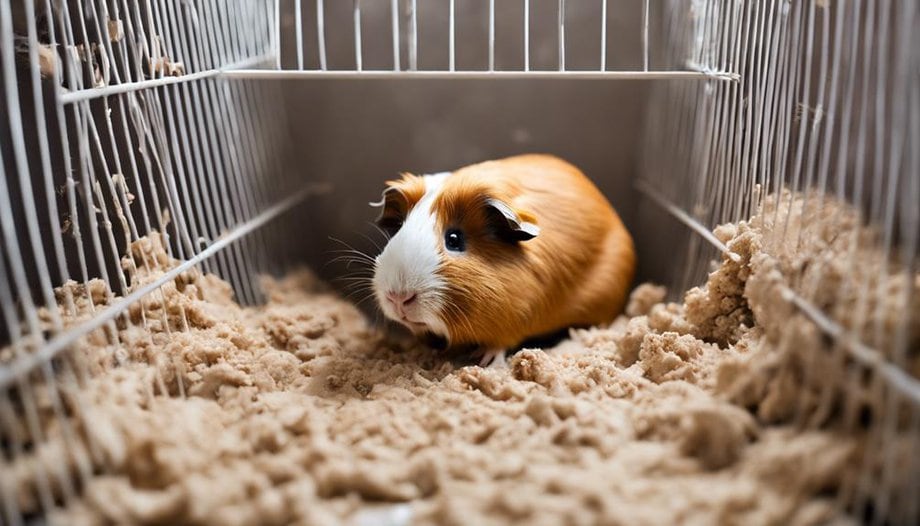
Respiratory issues can pose a significant threat to the health of guinea pigs, making it vital for owners to be vigilant. Common symptoms to watch for include sneezing, coughing, labored breathing, and nasal discharge.
Preventative measures, such as maintaining a clean cage environment, are key in safeguarding the respiratory health of these small pets.
Respiratory Infections Common
A common ailment affecting guinea pigs is respiratory infections, posing a significant threat to their health and well-being. These infections can arise from various causes, including poor cage hygiene and exposure to drafts or sudden temperature changes.
Here are some key points to bear in mind regarding respiratory infections in guinea pigs:
- Symptoms: Watch for signs like sneezing, nasal discharge, labored breathing, and lethargy.
- Prevention: Maintain a clean cage, provide proper ventilation, and avoid exposing your guinea pig to cigarette smoke.
- Treatment options: Seek veterinary care promptly. Treatment may involve antibiotics, nebulization, or supportive care.
- Isolation: Quarantine infected guinea pigs to prevent the spread of the infection.
- Regular check-ups: Schedule routine vet visits to monitor your guinea pig's respiratory health.
Symptoms to Watch for
To identify potential respiratory issues in guinea pigs, vigilant observation of key symptoms is important for ensuring their well-being and health. Watch for signs such as labored breathing, sneezing, nasal discharge, wheezing, or a decrease in activity level.
If any of these symptoms are noticed, prompt action is essential. Early intervention is key in managing respiratory problems in guinea pigs. Consult a veterinarian immediately for proper diagnosis and treatment options. Additionally, consider adjusting the guinea pig's diet to include foods rich in Vitamin C to boost their immune system.
Providing a clean environment, regular exercise regimen, and proper ventilation can also aid in preventing respiratory issues. Remember, proactive care and attention to detail are essential in safeguarding your guinea pig's respiratory health.
Prevention Through Cleanliness
Vigilant maintenance of a clean cage environment is paramount in safeguarding guinea pigs against potential respiratory issues. Guinea pigs are susceptible to respiratory problems, and a clean living space is essential in preventing illnesses.
Here are essential tips for cage maintenance to guarantee your guinea pig's respiratory health:
- Regular Cleaning: Clean the cage at least once a week to remove droppings and soiled bedding.
- Proper Ventilation: Guarantee good airflow in the cage to prevent the buildup of ammonia and other harmful fumes.
- Fresh Bedding: Replace bedding frequently to keep the cage dry and odor-free.
- Avoid Dusty Substrates: Choose bedding materials that are low in dust to reduce respiratory irritation.
- Monitor for Mold: Check for any mold growth in the cage, especially in hidden corners, and promptly remove it.
Preventing Infections and Diseases
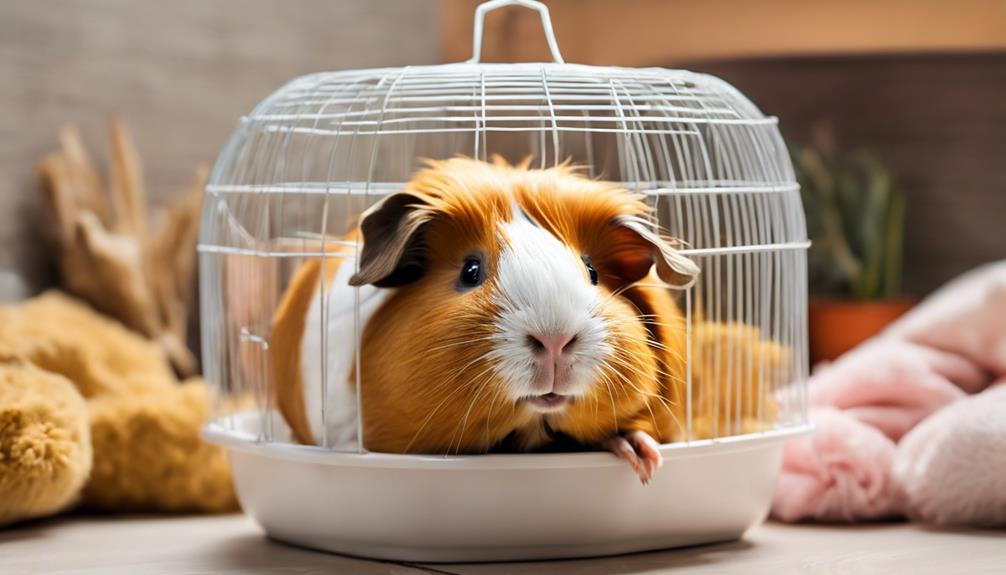
Maintaining a clean cage environment is essential for safeguarding a guinea pig's health and well-being, minimizing the risk of infections and diseases. Proper ventilation plays an important role in preventing the buildup of harmful bacteria and germs that could lead to respiratory issues and other health problems in guinea pigs. Ensuring that the cage has adequate airflow helps in maintaining a healthy environment for these small pets.
In addition to proper ventilation, maintaining good hygiene habits is paramount in preventing infections and diseases in guinea pigs. Regularly cleaning the cage, removing any leftover food, soiled bedding, and feces, is crucial to prevent the growth of harmful bacteria. Providing fresh water daily and washing food and water containers regularly can further reduce the risk of contamination.
Maintaining Hygiene in the Cage
A pristine cage environment is essential for safeguarding the health and well-being of guinea pigs. To maintain hygiene in the cage, proper organization and bedding selection are vital. Here are some key points to ponder:
- Cage Organization: Guarantee the cage is well-organized with designated areas for food, water, and hiding spots to promote a sense of security for your guinea pig.
- Bedding Selection: Choose bedding material carefully, opting for options like paper-based bedding or fleece that are comfortable, absorbent, and safe for your pet.
- Odor Control: Regularly spot clean soiled bedding and food areas to prevent the buildup of odors that can be harmful to your guinea pig's respiratory system.
- Ventilation Systems: Adequate ventilation is important to maintain fresh air flow and prevent the accumulation of ammonia from urine, which can be detrimental to your pet's health.
- Regular Monitoring: Keep a close eye on the cage cleanliness and your guinea pig's behavior to address any hygiene issues promptly.
Tips for Effective Cleaning Routine
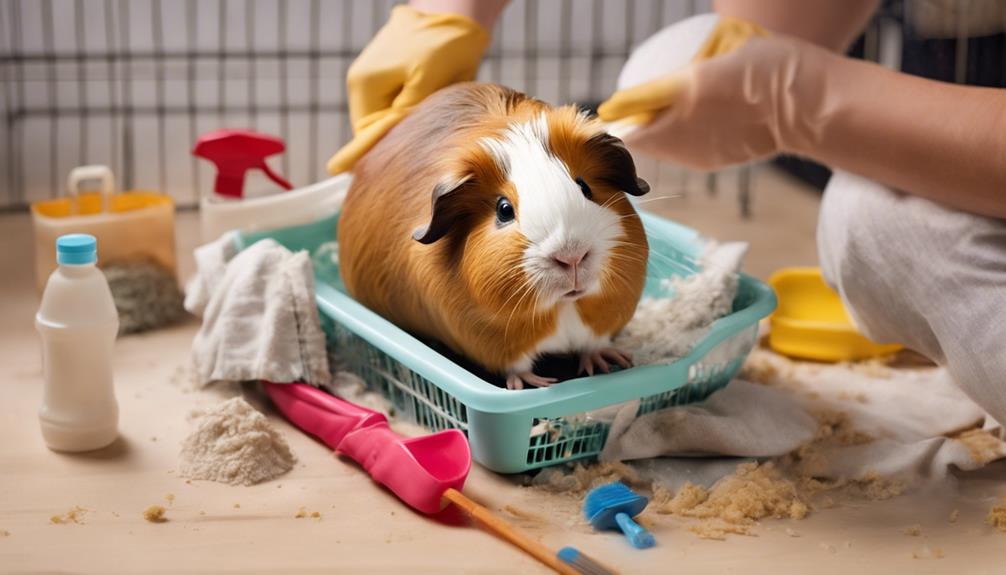
Maintaining a clean environment is important for the health of guinea pigs.
The frequency of cleaning and proper cage disinfection are essential components of an effective cleaning routine.
Frequency of Cleaning
Regular cleaning of the guinea pig cage is essential for maintaining a healthy environment and preventing potential health issues. To establish an effective cleaning routine, consider the following tips:
- Cleaning Schedule: Set a regular schedule for cleaning to keep the cage fresh.
- Cage Layout: Arrange the cage for easy cleaning access and to assure all areas are reached.
- Bedding Options: Choose bedding that's absorbent and easy to clean.
- Odor Control: Use bedding materials that help control odors between cleanings.
- Spot Cleaning: Quickly remove any soiled bedding or uneaten food daily to maintain cleanliness.
Proper Cage Disinfection
To guarantee a pristine environment for your guinea pig, meticulous cage disinfection is paramount for their overall health and well-being. Proper disinfection techniques involve using a pet-safe disinfectant to clean all surfaces of the cage thoroughly.
It's recommended to establish a regular cage cleaning schedule to prevent the buildup of harmful bacteria and odors. Ideally, spot cleaning should be done daily by removing any visible waste or uneaten food. A more thorough cleaning, including changing bedding and washing all accessories, should be conducted on a weekly basis.
Safe Cleaning Products for Guinea Pigs
Using gentle, non-toxic cleaning products is paramount for ensuring the health and well-being of guinea pigs in their living environment. When selecting cleaning products for your guinea pig's cage, opt for natural alternatives or recommended brands that are safe for small animals. Additionally, consider DIY cleaning solutions and homemade options to maintain a clean environment for your furry companion.
Here are some safe cleaning products for guinea pigs:
- White vinegar: A natural disinfectant that's safe for guinea pigs.
- Water: Plain water can be used for daily wipe-downs.
- Unscented soap: Mild, unscented soap can be used for cleaning accessories.
- Commercial pet-safe cleaners: Choose cleaners specifically formulated for small animals.
- Baking soda: Helps in absorbing odors and can be used for spot cleaning.
Monitoring Your Guinea Pig's Health
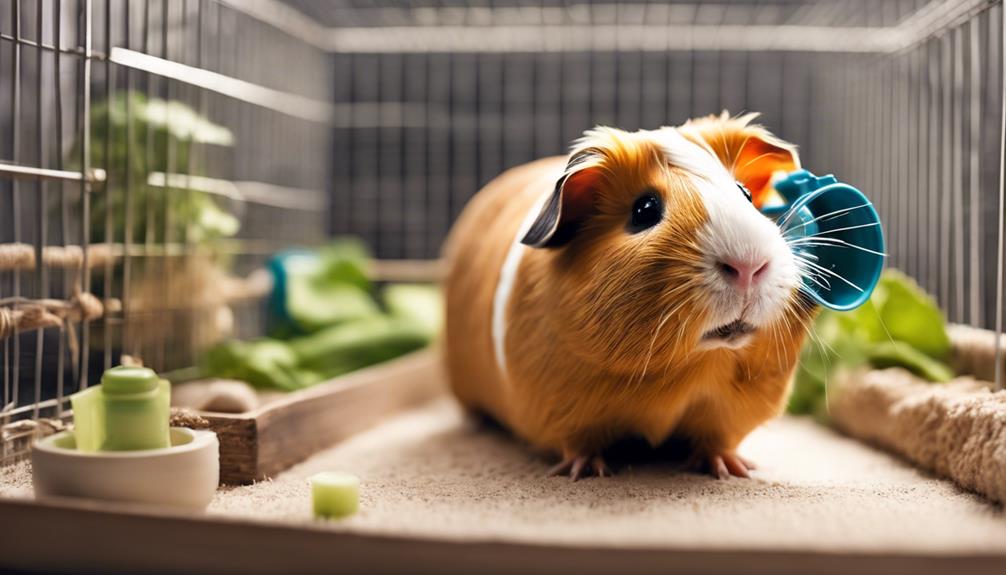
Monitoring the health of your guinea pig is essential for guaranteeing their well-being and early detection of any potential issues. Regular check-ups with a veterinarian are vital to assess your pet's overall health and address any concerns promptly. These routine visits allow for a thorough examination, including checking their weight, teeth, and overall condition. Additionally, discussing any dietary changes with the vet can help optimize your guinea pig's nutrition and prevent potential health problems.
Observing your guinea pig daily is also key to monitoring their health. Keep an eye out for any changes in behavior, appetite, or bathroom habits. Sudden weight loss, lethargy, or unusual discharges are signs that require immediate attention. By staying vigilant and proactive, you can guarantee your furry companion receives the care they need to stay healthy and happy.
Frequently Asked Questions
Can I Use Household Cleaning Products Like Bleach or Ammonia to Clean My Guinea Pig's Cage?
Using household cleaning products like bleach or ammonia to clean a guinea pig's cage can be harmful. Safe alternatives like vinegar and water are recommended. Always guarantee proper ventilation when cleaning to protect your guinea pig's health.
How Often Should I Change the Bedding in My Guinea Pig's Cage?
Changing the bedding in a guinea pig's cage is vital for maintaining cleanliness and odor control. Experts recommend rotating bedding every 3-4 days to prevent health risks associated with ammonia buildup and bacteria growth.
Is It Necessary to Clean My Guinea Pig's Cage Even if It Doesn't Smell Bad?
Regular cage cleaning is essential for guinea pig health, regardless of odor. Maintaining cage hygiene is vital to prevent health risks associated with bacteria buildup. Consistent cleaning routines create a safe, healthy environment for your furry companion.
Can I Use Scented Cleaning Products in My Guinea Pig's Cage?
Using scented products in a guinea pig's cage may seem pleasant, but it's risky. Fragrances can be harmful. Instead, opt for safe alternatives like vinegar or mild soap. Always take precautions to guarantee the well-being of your furry friend.
Are There Any Specific Signs or Symptoms I Should Look Out for to Indicate That My Guinea Pig's Cage Needs Cleaning?
To maintain top cage hygiene for guinea pigs, it's essential to adhere to a regular cleaning schedule. Keep an eye out for visual cues like foul odors, soiled bedding, or mold growth, as neglecting these signs can pose health risks.











